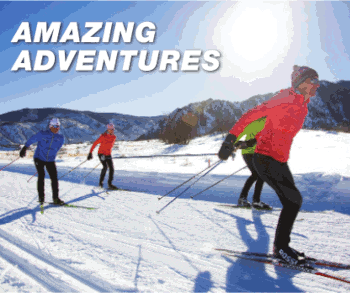December 3, 2005 (Sovereign Lake, B.C.) – With the Viessmann FIS Sovereign Lake World Cup opening ceremonies on today, festivities all week, and the competition just days away next weekend on Dec. 10-11, SkiTrax caught up with Chief of Competition, Rob Bernhart (also the president of the Sovereign Lake Nordic Club), and Toby Oswald Felker, Event Committee Chair.
Rob, when was the initial request to host a World Cup and how was Sovereign chosen?
RB: Our club was approached in April, 2003 after Cross Country Canada began to seriously investigate the possibility of hosting World Cups in Canada. The club Board of Directors decided to pursue it, although we did not believe it stood much chance of becoming a reality if the Vancouver 2010 Olympic bid was not successful. Our club put forward an expression of interest in hosting a World Cup and was selected as the candidate site for B.C. by Cross Country B.C. Several sites within Canada put forward such expressions of interest, however only Canmore, AB and Vernon, B.C. remained in the running. Soon after it became apparent that races were likely going to be awarded to Canada for December 2005. Our site has reliable early season snow and Canmore was intending to install new snowmaking equipment. From that time on (September 2003), Cross Country Canada has worked with both Vernon and Canmore to bring the two World Cup races to Canada. Both sites were then established on the FIS calendar for December 2005.
What factors needed to be considered before Sovereign Lake accepted the challenge to host a World Cup?
RB: Hosting a World Cup is a major undertaking. The Organizing Committee needs to be prepared to fully commit to the project for a period of years prior to the event. Millions of dollars worth of upgrades to accommodate a modern international event are required. The political will to fund the event needs to be generated along with the enthusiasm for the event that drives the recruitment of volunteers and creates commitment. Some key leaders needed to be identified at an early stage to see the project through. As a ski club, we needed to ensure the project had both the people and the financial resources to be successfully completed.
Toby, what are the biggest challenges in your position?
TOF: The biggest challenge in my position was finding the right people who could fill the roles required for the creation of the events around the competition. Areas such as Marketing & Communication, Hospitality & Protocol, Volunteer Care, Sponsorship etc. require a specific skill set that is not always easy to find. We have been extremely fortunate to have had some very talented people, many of whom have recently moved here from other parts of Canada, step up to the plate in jobs that have become a full-time occupation. Another extremely important requirement is the creation of a joint vision for the event that all parties can buy into.
Rob, what are the biggest challenges as Chief of Competition?
RB: Securing the funding for the project at the initial stages was a challenge that took a significant amount of time to overcome. The other area that has required much attention has been the planning and test events required to bring our event hosting standards up to the international level. It is a big step that cannot be taken in one stride.
Toby, there are many local sponsors for this event. What do you feel were there motivations for coming on board? Could this event happen without them?
TOF: An event of this magnitude would not have been even remotely possible without the support of the community and the businesses in the community. Our local sponsors have many reasons for being involved, but I would say for the most part they have become involved as good corporate citizens who want to give back to their community and help make the event a success. They have caught the “pure excitement” inherent in an international event of this magnitude and run with it.
Rob, can you talk about the legacy, the benefits to the community of cross country skiing in Sovereign Lake and the broader community across Canada?
RB: The legacy of this event is threefold. One aspect is the infrastructure that’s been created. The Sovereign Lake Nordic Centre undertook over $2 million in upgrades to accommodate this World Cup and that infrastructure will be primarily used by recreational skiers and our younger athletes in the years to come. Although the World Cup enabled it to be funded, the primary users will be everyday skiers. The event has also created an entirely new profile for the sport, at least in our region, if not throughout the province. Never before has so much media attention been focused on a cross-country ski event in B.C., nor have we ever seen such interest in broadcasting cross-country ski events. Local excitement about the World Cup is huge.
Toby, what if any changes would you make to the organization for the next international event?
TOF: Right now we are still focusing all of our efforts on creating an extremely successful event, but after it is over and we reflect on the process there will inevitably be improvements that could be incorporated into future events. When we began our planning there was really no specific format or road map that we could use, so for the most part we’ve designed and created our game plan utilizing the team’s experience and expertise. Going forward, future committees will be able to use our plans and format which will make the job much easier for the future. One change would be to start the entire process earlier.
Top News Stories
Interviews With Rob Bernhart and Toby Oswald Felker
2005 Viessmann FIS Sovereign Lake World Cup
by June HawkinsLeave a Reply
You must be logged in to post a comment.






![National camp action [P]...](https://null-skitrax.com/wp-content/uploads/2019/08/Duluth-4-2019-08-08-at-10.46.51-AM-300x246.png)
![Matt Liebsch on the CXC Elite Team [P] CXC...](https://null-skitrax.com/wp-content/uploads/2019/08/Matt-Liebsch-CXC.2-525x700.4-300x267.jpg)
![Dan LaBlanc [P]...](https://null-skitrax.com/wp-content/uploads/2019/08/Dan-LaBlanc-img_1855.3.jpg)
